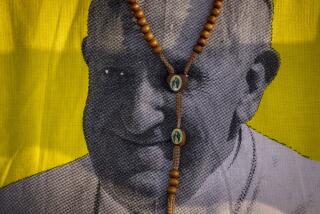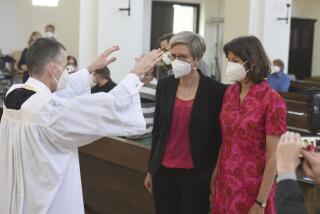Communion: an Executive Privilege?
Ever since President Clinton received Holy Communion from a Roman Catholic priest in South Africa, the White House and the Vatican have been scrambling to explain.
The church’s rules generally prohibit non-Catholics from receiving the sacrament, and no sooner had Father Mohlomi Makobane of Soweto, South Africa, placed the consecrated wafer on the president’s tongue March 29 than questions began pouring in from around the world.
Why were Clinton, a Southern Baptist, and his wife, Hillary Rodham Clinton, a United Methodist, permitted to receive the sacrament? Some Catholics protested that the rule-breaking smacked of privilege and power. Divorced Catholics who remarried outside the church--and thus are barred from receiving Communion--saw injustice.
The priest’s explanations did not seem to help. Makobane said he didn’t want to risk embarrassing the world’s most powerful leader by asking him to go back and sit down. Besides, Makobane said, African bishops have allowed more latitude than bishops elsewhere on the issue of non-Catholic Christians receiving Communion.
It wasn’t long before the Vatican and two American cardinals--Anthony Bevilacqua of Philadelphia and John O’Connor of New York--were weighing in to dispute the priest’s view.
O’Connor prefaced his remarks by explaining that his statement was not about the person of the president or his wife, but about church teaching. In that light, O’Connor said, he found Clinton’s Communion perplexing and “legally and doctrinally wrong,” no matter how “well-intentioned” the priest may have been.
“Since this is a person who is not a Catholic, he cannot be admitted to Eucharistic Communion,” O’Connor said. “This is a canonical norm and therefore no bishops conference can advance a different rule.”
After quoting Pope John Paul II, O’Connor went on to say: “From such words, it should be clear that Holy Communion is neither to be received nor given merely as an act of courtesy or a spiritual gesture.”
Meanwhile, the White House--more adept at handling political hot potatoes than ecclesiastical disputes--seemed to be saying that it knew more about Catholic practice, at least in Africa, than O’Connor.
“Cardinal O’Connor may not be familiar with the doctrinal attitude toward the Holy Eucharist that the conference of bishops in South Africa brings to that question,” White House press secretary Mike McCurry told reporters. He said African bishops have “a more ecumenical view.”
“Our understanding was that the [Communion] invitation was extended on behalf of the Conference of South African Bishops,” McCurry added. Asked if the president had any regrets, McCurry said, “No, the president was happy to receive the invitation to participate and was glad that he did.”
McCurry’s comment drew a brusque rejoinder from O’Connor’s spokesman, Joseph Zwilling.
“Cardinal O’Connor certainly is aware of what the Catholic Church teaching on what Holy Communion is and who is eligible to receive Holy Communion and under what circumstances,” said Zwilling. “Mr. McCurry is completely wrong.”
Clinton, of course, is not the first prominent non-Catholic to receive the sacrament in a Catholic parish. For example, the new owner of the Los Angeles Dodgers, Rupert Murdoch, a non-Catholic who has contributed to the church, received Communion on Jan. 11 during rites at St. Francis de Sales Church in Sherman Oaks when he was inducted into the Order of St. Gregory the Great.
For Catholics and their church, the controversy is no small matter. The Eucharist, Greek for “thanksgiving,” is their central act of worship.
During the Eucharist, or Holy Communion, the consecrated bread and wine is believed to become the body and blood of Jesus Christ. The church teaches that the sacraments are aids to salvation and in themselves are a cause of grace. According to the church, those who participate in the sacraments experience the love and power of God that flows from Christ’s Passion, death and Resurrection.
As such, the church teaches that the Eucharist must not be received unworthily. For a Catholic to do so would be sacrilege. For a non-Catholic to unworthily receive the sacraments would also be considered an “objective sin.” The church, however, notes that it cannot subjectively know the mind and heart of the person involved. That would be between that individual and God.
There are limited situations in which a non-Catholic Christian may receive Communion from a Catholic priest, but the individual must meet each of five conditions. The non-Catholic Christian must:
* Be in a situation of “grave necessity.” This usually means near death, but it could also be interpreted to mean a kind of grave spiritual necessity separate from physical peril.
* Be unable to request the Eucharist from a minister of his or her own church.
* Ask for the sacrament.
* Be spiritually and morally prepared.
* Give evidence of holding to Catholic teaching on the Eucharist.
Southern Baptists, United Methodists and Presbyterians, unlike Catholics, do not believe that the Eucharist is literally the body and blood of Christ. Protestants see the bread and grape juice (which is substituted for wine) as mere emblems of Christ’s atoning death.
Times staff writer John Dart contributed to this story.
More to Read
Sign up for Essential California
The most important California stories and recommendations in your inbox every morning.
You may occasionally receive promotional content from the Los Angeles Times.










